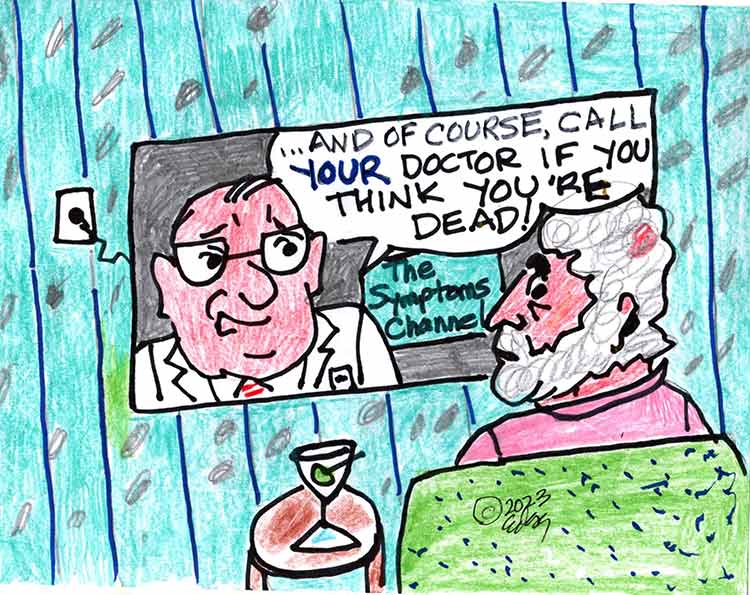Do You Practice Self-Diagnosis? Without a License?
The dangers of cyber medical tips
By Ed Goldman
When I don’t feel entirely up-to-snuff—and discover that my snuff supplier will be out of town for two years and 500 community-service hours—I engage in the perilous activity called self-diagnosis.
“Self-diagnosis” itself is a dubious term. While it can be interpreted as diagnosing what’s ailing you-and-you-alone, it also seems to imply that you’re embarking on this project without any help.
Hell hath no fury
But you’re getting a lot of help. You start by going to reasonably reputable websites—like the Mayo Clinic, Harvard School of Medicine and Web MD—but it doesn’t take long before you’re also feeding your symptoms into your search engine and playing healthcare potluck at sites with names like YouAreSoSick dot org and Hypochondriacs’r’Us dot net. (Note to under-the-weather younger readers: Relax your thumbs. These sites don’t exist. Yet.)
Anyway, by intensely body-surfing the web, this is how I found out not long ago that what I thought might be a peptic ulcer was more likely a case of menopause belly.
As you know, the Internet is a remarkably rapid resource for misinformation. This is especially true for medical questions. As the (genuine) website verywellhealth.com posted in late Summer, “Anyone can post online. Information may be inaccurate, misleading, or even intentionally manipulative. Confirmation bias: Whether you’re worried that you’re dying or certain your symptoms mean nothing, you can probably find a website out there to agree with you.”
I’m sorry to report that this reminds me of an old joke. Two physicians are chatting and one asks the other how a patient, a known hypochondriac, was doing. “Not so well,” is the reply. “Now she thinks she’s dead.”
One more old joke (at least for today): Two psychiatrists greet each other. “How am I?” the first one says. “Not bad,” the other says, “and how am I?”
Meanwhile, a website called bigthink.com reports, “A new survey of Americans suggests that online self-diagnosing often leads to stress and unreliable information. Forty percent of respondents said they had received inaccurate diagnoses online.” I hope this doesn’t mean the other 60 had to rely on their survivors to answer the questionnaire.
“Still,” bigthink admits, “symptom-checkers can be useful, especially for determining when to go to the hospital.” I’m not so sure about this. What if you’re contemplating going to the hospital simply to visit someone? And what if you’re not entirely convinced you even like him or her? How would you present those symptoms?
ONLINE CHAT PERSON: Hi, welcome to WebQuack. How may I help you?
YOU: I’m thinking of going to the hospital. Not for me, but to visit someone.
ONLINE CHAT PERSON: And?
YOU: Well, it’s someone who I firmly believe stole one of my Jedi figurines when he stayed here so we could attend Comic-Con together. He wore a Luke Skywalker costume and I was dressed as Princess Leia.
ONLINE CHAT PERSON: Really?
YOU: Why is that surprising?
ONLINE CHAT PERSON: You, uh, sound like a guy.
YOU: And?
ONLINE CHAT PERSON: Okay, listen, I have only 10 more minutes on my shift and six years to retirement. Are you experiencing symptoms—other than thinking you’re “Lady Vader,” as I believe Princess Leia is sometimes referred to.
YOU: Yes, I am. Experiencing symptoms, I mean. Not “Yes, I am Lady Vader.”
ONLINE CHAT PERSON: Noted.
YOU: When I think of going to the hospital to visit this person who copped one of my Jedi figurines, I get terribly anxious, short of breath and a mild case of vertigo.
ONLINE CHAT PERSON: How mild a case?
YOU: Well, I think I’m Kim Novak for a while.
ONLINE CHAT PERSON: I’m sorry. You think you’re whom?
YOU: Kim Novak. She starred in “Vertigo.” Great Hitchcock movie!
ONLINE CHAT PERSON (After a pause): Tell you what you do. Take two figurines, shove them–
YOU: I can’t hear you la, la, la!
ONLINE CHAT PERSON: —and call here in the morning.
YOU: That’ll be great.
ONLINE CHAT PERSON: It sure will. I’m off tomorrow.
Ed Goldman's column appears almost every Monday, Wednesday and Friday. A former daily columnist for the Sacramento Business Journal, as well as monthly columnist for Sacramento Magazine and Comstock’s Business Magazine, he’s the author of five books, two plays and one musical (so far).
Yes, Virginia
A Weekly Blog by Virginia Varela
President, Golden Pacific Bank, a Division of SoFi Bank, N.A.
photo by Phoebe Verkouw
FRAUDS ARE NOT YOUR FRIENDS
Can someone use your identity to commit bank fraud?
Absolutely. Identity theft was the number one reported type of fraud in 2020, according to the FTC. When scammers gain access to your personal information by phishing, for example, they can do one or more of the following:
– Gain access to your bank account and spend or transfer all your money
– Create new bank accounts in your name and take out several loans on your behalf
– Spend your money on a shopping spree
– Access your government benefits, such as unemployment benefits
Scammers might also access your emails and social media accounts. Then, they’ll contact your friends and loved ones and try to carry out bank scams on them as well, capitalizing on their trust in you.
If you’re the victim of a bank scam, it’s crucial that you act as soon as possible.
Banks and other insurance policies typically only cover financial fraud if you report it within a short timeframe. Wait too long and you might be on the hook for money you legitimately lost.
Take the following actions, as soon as you discover you’ve fallen victim to a bank scam:
– If you unknowingly granted the scammer access to your credit card information. Call your card issuer and alert them that your credit card numbers were stolen. They can help to cancel the card hopefully before the scammer uses it or withdraws any funds.
– If the scammer has already withdrawn funds using your card information. Report the transaction as fraudulent to your credit card company and file an identity theft claim with the FTC. The card company may be able to reverse the transaction.
– If you paid the scammer yourself using a wire transfer, check, debit or credit card. You can also report the credit card scam or transaction as fraudulent to your bank.
– If you paid the scammer using a gift card. Call the gift card company and report the transaction as fraudulent.
– If you send the scammer funds using a payment app or cryptocurrency. Report the transaction as fraudulent by calling the app’s customer service department.
– If you sent money by the U.S. Postal service. Call the U.S. Postal Inspection Service to intercept the package at 877-876-2455.
– If you shared sensitive information such as passwords. Change your passwords right away and check to see if other accounts have been compromised and shared on the Dark Web.
Next Week: Skipping The Scam!
sponsored content














